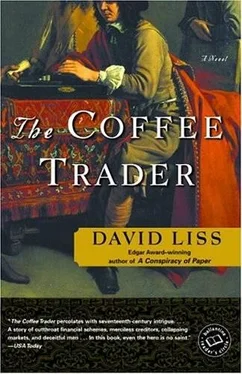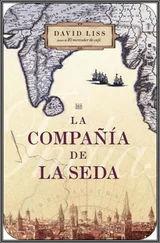He had no reason to dislike Antonia, but neither did she appeal to him. She was a handsome woman, but he did not find being with her a handsome experience. Miguel had seen a picture of her before they met, and he had been most pleased by the miniature portrait, but though it was a good likeness, the painter had rendered her features far more animated than nature had done herself. Miguel would sit in Parido’s front room, taking stabs at conversation with a girl who would not meet his eye, asked no questions not directly related to the food or drink set out by the servants, and could answer no questions with words other than “Yes, senhor” or “No, senhor.” Miguel soon became intrigued by the idea of teasing her and began asking her questions touching on theology, philosophy, and the political skullduggery of the Vlooyenburg. Such inquiries produced the far more entertaining “I could not say, senhor.”
He knew he ought not to take such pleasure in torturing his future wife, but there was little else of interest to do with her. What it would be like to be married to so dull a woman? Surely he could mold her more to his liking; he could teach her to speak her mind, to have opinions, possibly even to read. And in the end, a wife was merely someone to produce sons and keep an orderly house. An alliance with his brother’s patron would be good for his own business, and if she was good for nothing more, there were whores enough in Amsterdam.
So, possessed of every intention of following through on his promise, Miguel had been discovered by Antonia in her maid’s room-he with his breeches down, she with skirts lifted. The shock of walking into the room and facing Miguel’s bare ass aimed in her direction had proved overwhelming, and she had let off a shriek before fainting and knocking her head against the door on her way down.
The planned marriage between the two was certainly ruined, but disgrace could have been avoided, and Miguel considered it entirely Parido’s fault that the incident had turned to scandal. Miguel wrote him a long letter, begging forgiveness for having abused his hospitality and unwittingly bringing embarrassment upon him:
I cannot ask you to think no more of these events or to put them from your mind. I can only ask that you believe I never wished to see either you or your daughter harmed, and I hope the day may come that will provide me with an opportunity to demonstrate the extent of both my respect and my remorse.
Parido had sent back only a few harsh lines:
Make no effort to contact me again. I care nothing for what you imagine as respect or how you scheme to frame your meager remorse. You and I must be now opposed in all things.
The letter did not mark the end of the conflict, much to the delight of the gossiping wives of the Vlooyenburg. The maid, it was soon discovered, was with child, and Parido publicly insisted that Miguel provide for the bastard once born. With popular sentiment on Parido’s side, for he had kept his breeches on through the whole affair, Miguel endured a week in which old women hooted at him and spat in his direction and children tossed rotten eggs at his head. But Miguel would not accept these accusations. Experience had taught him a thing or two about reproductive rhythms, and he knew the child could not be his. He refused to pay.
With a mind set to vengeance rather than justice, Parido insisted that Miguel be brought before the Ma’amad, to which Parido had not yet been elected. The council was well used to these paternity disputes, and its investigators revealed the father to be Parido himself. Finding himself publicly humiliated, he retired to private life for a month, waiting for some new scandal to entertain the neighborhood. During that month, believing that Antonia could never find a husband in a city that knew she had seen Miguel Lienzo with no breeches, he sent his daughter to marry his sister’s son, a merchant of moderate standing in Salonika.
The world knew the story-that Miguel was to have married Antonia Parido, that the engagement had fallen into ruin, and that Parido had made accusations that had come back to haunt him. There was something that the world did not know.
Miguel had been unwilling to sit idly by while the Ma’amad decided the case, for Parido was a powerful man, destined for the council, and Miguel was but an upstart trader. So he had gone to see the little doxy and conducted his own inquiry. After Miguel had prodded her for some time, she finally admitted that she could not name the child’s father. She could not name him because there was no child; she only claimed that one grew in her belly because she wanted something for her trouble, being cast out on the street as she was.
Miguel might have tried to convince her to tell the truth, and in doing so perhaps restore himself somewhat in Parido’s eyes, but Parido might also have spat upon that gesture. Instead, Miguel explained to the girl that if she convinced the Ma’amad investigators that the child was Parido’s, she would profit most handsomely for her trouble.
Parido, in the end, gave the girl a hundred guilders and sent her on her way. Miguel could once more walk the streets of the Vlooyenburg without fear of assault from grandmothers and children. However, a new disquiet had taken the place of the old. If Parido were ever to learn of Miguel’s treachery, he would show no mercy.
The great open-air Exchange spread out before them, in structure no different from every other bourse in every trading center in Europe. Amsterdam ’s Exchange was an enormous rectangle, three massive red-brick stories in height, with an overhang along the inner perimeter. The center remained exposed to the elements, such as the misting rain that now fell, so light as to be indistinguishable from fog. Along the interior and beneath the overhang supported by thick and magnificent columns, scores of men gathered to shout at one another in Dutch or Portuguese or Latin or a dozen other tongues of Europe and beyond, to buy and sell, to trade rumors, and to attempt to predict the future. Each section of the Exchange had, by tradition, its own designated business. Along the walls, men traded in jewels, real estate, woolens, whale oil, tobacco. A merchant could converse with dealers in goods of the East Indies, the West Indies, the Baltic, or the Levant. In the less prestigious roofless center gathered the wine merchants, paint and drug sellers, traders with England, and, toward the far south end, dealers in brandy and the sugar trade.
Miguel regularly saw Spaniards and Germans and Frenchmen. Less frequently, he might encounter Turks and even East Indians. It was something of a mystery why this city should have emerged in the last fifty years as the center of the world’s trade, attracting merchants from every land of importance. It should hardly have been a city at all; the locals liked to say that God created the world, but the Dutch made Amsterdam. Carved out of swamp, plagued with a port only the most skillful pilot could navigate (and then only with luck on his side), lacking any native wealth except for cheese and butter, Amsterdam rose to its place of greatness because of the sheer determination of its citizens.
Parido walked silently for only a few moments, but Miguel could not shake the feeling that the parnass derived some pleasure from withholding his business.
“I know your debts weigh heavily on you,” Parido began at last, “and I know you’ve been trading in brandy futures. You’ve gambled that the prices will rise. By closing, two days hence, however, they will surely remain as low as they are now. If I calculate correctly, you stand to lose close to fifteen hundred guilders.”
This was about brandy, not coffee, thank the Most High. But what did Parido know about it-or care, for that matter? “It is closer to a thousand,” he said, hoping to keep his tone even. “I see you’re well informed of my business.”
Читать дальше












